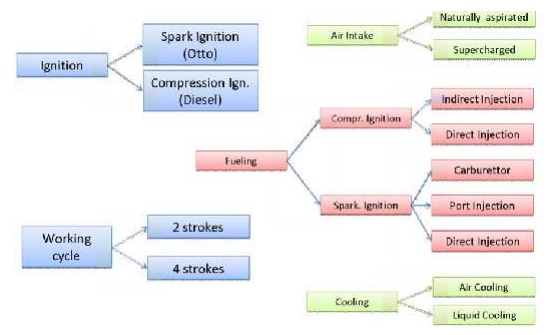Chapter: Mechanical and Electrical : Thermal Engineering : Internal Combustion Engines
Internal Combustion Engines
INTERNAL COMBUSTION ENGINES
PRE-REQUISITE DISCUSSION
The first internal-combustion
engine, according to our modern ideas, was that of Robert Street, patented in
England in 1794. In this the bottom of a cylinder was heated by fire and a
small quantity of tar or turpentine was projected into the hot part of the
cylinder, forming a vapor. The rising of the piston sucked in a quantity of air
to form the explosion mixture and also flame for ignition. The cycle was that
which was used later by Lenoir in the first commercially successful engine.
About 1800 Phillippe Lebon patented in France an engine using compressed air,
compressed gas and electricity for ignition. Some authorities believe that his
early death retarded the development of the internal-combustion engine half a
century, as all of the features mentioned are necessary to the highly efficient
engines of today, though they did not come into use for three-quarters of a
century after his death.
The well-known Otto engine was
invented by Dr. Nicholas Otto, of Germany, and was patented in this country in
1877. It follows the cycle that has been described by Beau de Rochas , now
known as the four-cycle, or sometimes as the Otto cycle. The engine was first
known as the Otto-Silent, to distinguish it from the free-piston engine, which
was rather noisy. It immediately established the internal-combustion engine on
a firm footing, and the engines of the four-cycle type sold today show merely
minor improvements.
The
development of the Diesel engine for oil began about 1894. As has been stated,
this engine is similar to the Brayton. Air is compressed to about 500 pounds
pressure and oil is sprayed into this highly compressed air. It burns
spontaneously at nearly constant pressure, which is followed by a long
expansion. The extremely high temperature of the air previous to the injection
of the fuel, and the high temperature maintained during this injection,
together with the long expansion, give the engine the highest efficiency of any
thermal motor. The development of the Diesel engine has been so recent that it
is not necessary to elaborate upon it. At this time, it is being manufactured
in all of the European countries and in America, and there is a tendency on the
part of many of the American manufacturers who are bringing out new engines to
adopt the features of the Diesel. The gas turbine is as yet in the experimental
stage. A number have been built and are of course, extremely interesting. The
success of the steam turbine has encouraged many to believe that the gas
turbine will achieve similar success. Nothing of recent development can be said
to encourage this view. The difficulties in the way of successful gas turbines
are very great, and while some turbines have been designed and run, none of
them has shown an efficiency at all comparable to that of ordinary four-cycle
engines.
The Concept of IC Engine
The internal
combustion engine (ICE) is an engine where the combustion of a fuel
(normally a fossil fuel)
occurs with an oxidizer
(usually air) in a combustion chamber that is an integral part
of the working fluid flow circuit.
The most significant improvement
offered by the Concept IC Engine:
Ø The most
significance of IC engine in Day to day life, It is a lightweight and
reasonably compact way to get power from fuel.
Ø It is
also significantly safer and more efficient than the engine it replaced -
steam.
Ø Small,
lightweight IC engines made personal transportation possible. It transformed
how we built cities and did business.
Classification
of IC Engines:

Related Topics